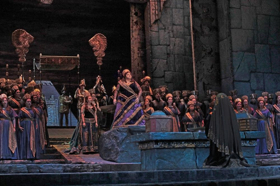Review Roundup: SEMIRAMIDE at the Met - What Did The Critics Have To Say?

This masterpiece of dazzling vocal fireworks makes a rare Met appearance-its first in nearly 25 years-with Maurizio Benini on the podium. The all-star bel canto cast features Angela Meade in the title role of the murderous Queen of Babylon, who squares off in breathtaking duets with Arsace, a trouser role sung by Elizabeth DeShong. Javier Camarena, Ildar Abdrazakov, and Ryan Speedo Green complete the stellar cast.
Additional performances of SEMIRAMIDE will take place on February 24 and 28; March 3, 6, 10mat, 14 and 17. Curtain times vary: complete schedule here. Running time is listed as 3 hours and 29 minutes with one intermission, but it ran longer at the opening.
Saturday, March 10 matinee performance will be transmitted worldwide as part of the Met's "Live in HD" series, which is now seen in more than 2,000 movie theaters in 73 countries around the world.
Tickets begin at $25; for prices, more information, or to place an order, please call (212) 362-6000 or visit www.metopera.org. Special rates for groups of 10 or more are available by calling (212) 341-5410 or visiting www.metopera.org/groups. Same-day $25 rush tickets for all performances of the opera are available on a first-come, first-served basis on the Met's Web site. Tickets will go on sale for performances Monday-Friday at noon, matinees four hours before curtain, and Saturday evenings at 2pm. For more information on rush tickets, click here.
Let's see what the critics have to say!
Richard Sasanow, BroadwayWorld: The production, designed by John Conklin with costumes by Michael Stennit, looked impressive with its gold and blue motif and giant reliefs that could have come from the Met Museum's Middle East collection. Was it a bit overdone in its opulence? Well, so what; it worked very well. The production's original director, John Copley, disappeared before the opening, due to some unwelcome remarks to a chorister, but stage director Roy Rallo kept things rolling along through all the opera's gymnastics.
Zachary Woolfe, The New York Times: Directed then by John Copley (who returned to supervise this revival before being fired a few weeks ago for making what the Met called a "sexually demeaning remark" to a chorister during a rehearsal), the production shamelessly courts camp. A stage full of Babylonian ruin and rubble is frosted in tarnished gilt. The costumes (by Michael Stennett) time and again challenge your notions of how many different kinds of fabric can coexist in a single gown. The efficiently gaudy show doesn't have a deep thought in its head but, in its bombastic way, it's modest and true.
David Salazar, OperaWire: That said, the true star of the night was Elizabeth DeShong as Arsace. From the first note to her last, she suited the vocal lines perfectly. The coloratura was pure and clean at all moments, and she seemed to be exploring its expressive qualities throughout. In her opening aria, it took on a more gentle touch as Arsace thought of Azema. In the confrontation with Assur, the voice was more accented, exploring the tension and hatred Arsace feels for Assur. In moments with Semiramide, it took on a nobler quality, the voice filling out to match Meade's far more voluminous quality. DeShong's lows were splendid and even if the voice doesn't possess the biggest sound, it has a clarity that is simply stunning in its beauty.
David Wright, NY Classical Review: Presiding over the whole drama, at beginning and end and at key moments along the way, was the imposing physical and vocal presence of bass-baritone Ryan Speedo Green as the high priest Oroe. In a plot swirling with conspiracies, mistaken identities, and love triangles and polygons, Green's steady performance provided a gods'-eye view.
James Jorden, Observer: Even with a more luxurious cast of singers, though, this Semiramide might have fizzled due to Maurizio Benini's limp conducting and John Copley's gaudy low-camp production. In the director's cheesy vision, ancient Babylonians held court among clumps of shattered styrofoam "masonry" and the seductive queen was styled as Barbara Bush in a Bernadette Peters wig.
George Loomis, Financial Times: Angela Meade is a vocal powerhouse as the repentant Babylonian queen Semiramide, who schemed with Prince Assur to murder her regal husband, Nino. Semiramide has a falling-out with Assur in a scene that has some of her most intense utterances, and Meade handles them with aplomb. But her upper tones tend to spread at full voice, and I kept wondering what Joyce DiDonato, much acclaimed at the ROH, would have done with the role.
Justin Davidson, Vulture: If you happened to be out of town (or, say, in kindergarten) in the early 1990s when John Copley's production of Rossini's Semiramide ran for 19 performances, then the only other chance you might have had to see this opera at the Met was in 1895. The reason for this third appearance in three consecutive centuries is simple: Angela Meade, the soprano whose high-horsepower voice and hummingbird nimbleness is a rare match for Semiramide's semiquavers.
Reader Reviews
Videos

